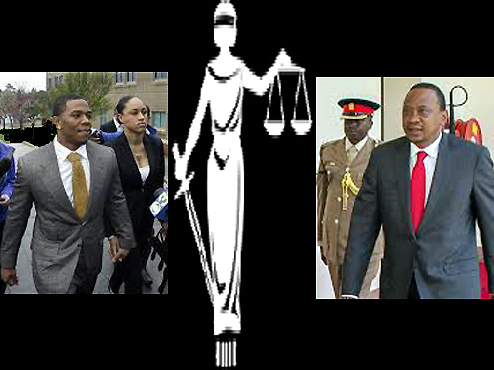 Imagine Ray Rice walking into court followed by Eli and Peyton, Adrian Peterson, a few veterans like Mike Ditka and then a couple hundred high rolling NFL fans.
Imagine Ray Rice walking into court followed by Eli and Peyton, Adrian Peterson, a few veterans like Mike Ditka and then a couple hundred high rolling NFL fans.
He’d be saying, “Some people think I did something wrong. Maybe I did. But I had to,” or maybe not ‘I had to’, rather “They understand why I did.”
And that understanding spans the gamut from being cuckoo to especially stressed. And in any case, it’s acceptable because, gdi, we need that guy playing the game!
And … he wouldn’t have done it, if he didn’t have to.
And since that “have to” spans the same gamut from being cuckoo to especially stressed, we get in a loop that we can’t get out of.
This is exactly what’s happening with the President of Kenya.
Next week President Uhuru Kenyatta will leave the Nairobi airport surrounded by probably hundreds if not thousands of cheering supporters for The Netherlands, where he’s on trial for crimes against humanity.
Whether World Court officials will allow his entourage to enter the vaulted halls of the ICC with him, he will be accompanied to the portals by at least four other Heads of State, maybe more, and by more than 100 elected Kenyan members of Parliament.
The facts in Kenyatta’s trial have come out in the press, mostly, since important witness after important witness has been so intimated that they’ve dropped out or disappeared. So now the spent prosecutors at the World Court have little facts left to present.
The facts as most of us believe them but which have not been able to justly be presented in court are pretty simple. The national election of 2007 was close. The current head of Kenya’s opposition from its second largest tribe, Raila Odinga, was neck and neck with the then president of Kenya running for reelection, Mwai Kibaki. Kibaki was a Kikuyu, the largest tribe and the tribe of Kenyatta.
Kibaki was old, Kenyatta was young. Kenyatta’s father, Jomo Kenyatta, is the “Father of Kenya” and its first president.
Widespread violence followed the election and the country was brought to its knees. Almost 1500 people were killed in horrific violence and a quarter million displaced, of which dozens of thousands remain so today.
There were absolute differences in ideology clashing, but the violence was tribal.
The settlement forced on Kenya by Britain and the United States was brilliant. Kibaki and Odinga shared power for almost five years. During that time a new and fabulous constitution was adopted.
The settlement required Kenya to determine the cause of the violence and prosecute those responsible. The settlement went further: Kenya had a certain window of time to attain this justice, and if it failed, then the World Court in The Hague would step in to do the task.
Kenya failed. Parliament tried several times to create courts and procedures for this most important attempt at national justice in its history, but at the end of the day, an invitation was sent to the World Court.
The World Court did not really want to do this. No indictment for crimes against humanity had been issued before the court was invited by Kenyans to start searching. Normally, the court issues indictments, as it did in Liberia for example, in response to individual petitioners. There were no individual petitioners with individual grievances from Kenya. The Kenyan Parliament invited The Court to take over, and it said, OK.
When it finished its several years of investigations, fully supported on the ground in Kenya by Kenyans, indictments were issued.
One was against the country’s current Vice President. The other was against Uhuru Kenyatta.
We know from leaked testimony and tapes that Uhuru Kenyatta, then a powerful political leader and Member of Parliament, organized and managed partisans in widespread murder and thuggery of the rival tribe.
This is against the law. It’s a crime against humanity.
But Kenya is doing pretty well, right now. Like all the rest of the world, the happiness and prosperity is happening mostly at the top, but the social fabric is peaceful. An unexpected war in Somalia, thrust upon it mostly by British, French and American interests, is not easy, but Kenya is handling it pretty well.
Skyscrapers are popping up all over. Roads are being built faster and better than in the U.S. Business was booming and is now humming along pretty well.
Even President Obama sat with Uhuru in the White House.
Like Rice, maybe he did do it. But take Rice or Uhuru out of the spotlight, out of their circles of power, and what happens? The team loses, and we just can’t afford that.